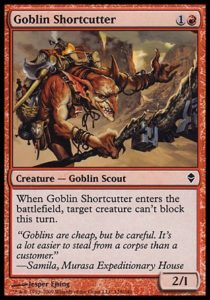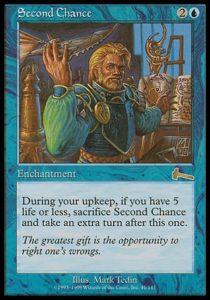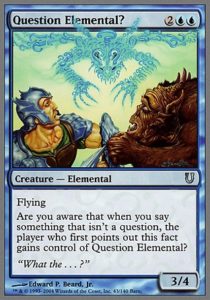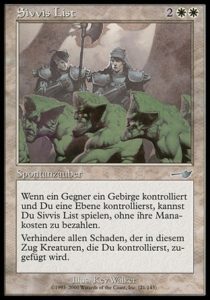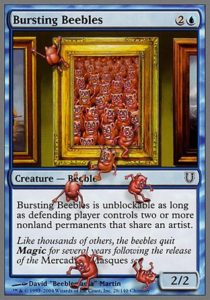In life, as in Magic, some questions are more important or higher priority than others. “Do I have food to eat?” is a higher priority question than, “when are we seeing the Avengers?” There’s no point in asking the lower priority question if the former is unanswered. Knowing what’s most important keeps one focused on one’s goals, rather than letting one get bogged down by non-critical concerns.
In Magic, the hierarchy of questions is subtler, but still critical. “Do I cast [casthaven]Voyage’s End[/casthaven] or [casthaven]Crux of Fate[/casthaven] now?” can be nuanced questions, but they’re less important than, or subsumed within the more critical/broad question, “how do I win?” In this article, I’ll focus on the most important questions one should consider in every game of Magic. These questions are mental shortcuts designed to help one play better and faster.
“How do I win?” is the most important question. Yes, it’s very broad, and yes, it’s obvious, but it’s one you should always consider and (at least try to) have an answer to. If you ever forget to ask yourself what you need to win, you’re likely getting bogged down in some less important subgame. Sure, playing around your opponent’s [casthaven]Tread Upon[/casthaven] or [casthaven]Coat with Venom[/casthaven] is part of playing Magic, but players lose games because they’re more focused on not getting ‘blown out’ than winning. Don’t fall into this trap.
The most important time to ask yourself what you need to do to win is when you’re losing or the game is at parity: what card(s) do you need to topdeck to turn the game around? What mistakes can your opponent make that’ll help you snatch victory from the jaws of defeat? What is the most important resource and how can you acquire it? Knowing what you need to win isn’t an easy question and the answer can change quickly in the middle of the game.
“How do I lose?” is the runner-up for most important question. Once you know how you win, you need to know what can derail your victory. Furthermore, you need to distinguish between what you can and cannot control. If you know that your opponent has [casthaven]Temur Battle Rage[/casthaven] in her deck, and you can play around it by holding up [casthaven]Flatten[/casthaven] or double-blocking her [casthaven]Gore Swine[/casthaven], then that’s probably correct to do. However, if that [casthaven]Temur Battle Rage[/casthaven] will beat you, no matter how you play, then you need to act as though your opponent doesn’t have it—there’s no point in playing around something that you cannot stop.
Never lose sight of question #1: if playing around [casthaven]Temur Battle Rage[/casthaven] will drastically impede your ability to win the game, even if it’ll keep you from losing, perhaps you shouldn’t play around it (since winning is better than, and not always the same as not losing).
“What is the most important resource?” is a question that contains many others, including the commonly used, “who’s the beatdown?” Once you identify the resource most important to you, your opponent, and/or the game in general, you can go about pressing your advantage or undoing your disadvantage.
→If you’re on the defensive and your opponent is pressuring you, then your Life Total is probably your most important resource. You should probably aggressively trade removal spells and creatures to keep yourself alive. Card advantage is useless if you’re dead, after all.
→If you’re being attacked and have poor defenses, perhaps your offense can outpace your opponent’s and you should race them. Perhaps you’re the aggressor or you know that your opponent’s long-game trumps yours. In these cases, you should aggressively spend removal spells and creatures (and possibly your life total) to get in damage. Your most important resource is tempo. You’re trying to leverage your advantage and win now.
→If you’re not all-out on offense but aren’t in danger of being immediately overwhelmed by your opponent’s offense, you should probably focus on gaining card advantage. Your life total is a resource that you can spare. Focus less on tempo and more on playing more impactful spells, or at least more spells, than your opponent. Similarly, if you’re at parity with the opponent and can’t find an opening to be aggressive, you should find ways to gain card advantage and eventually break the board stall.
→Finally, don’t forget that positions can shift. Sometimes, your or your opponent’s aggression falters and the game stops being about tempo and becomes about card advantage. Sometimes, you obtain control of the game and should shift from offense to defense, or vice versa.
I try to keep a simple list, to keep my mind on the game. It’s not a perfect list, but I recommend having something akin to it to keep one’s eyes on the prize.
How do I win?
→Is the current situation good for me? Do I need it to change?
→If I’m ahead, how do I end the game?
→If I’m behind, what are my outs? What do I need to happen to win?
How do I lose?
→If I’m ahead, what are my opponent’s outs? What does my opponent need to happen to win?
→If I’m behind, do I need to prolong the game or end it now?
→If there is something that I absolutely, 100% cannot beat, assume that my opponent doesn’t have it. There’s no point in playing around it.
What is my most important resource?
→Am I behind and in danger of dying? I should preserve my life total.
→Am I on the offensive? Can I not win the long game? I should press my tempo and attack.
→Is the board at parity? I should aim for card advantage.
Finally, you should periodically ask: Has something changed?
→Has my or my opponent’s position changed? Is someone else ahead/behind?
→Should I start or stop attacking?”
That’s it for today. Thanks for joining in on some pretty general Limited theory that I hope is of use. I’ll see y’all next week after GP Atlantic City, which I’m sure will be exciting.
And as always, thanks for reading.
—Zachary Barash
Zachary Barash has been playing Magic on and off since 1994. He loves Limited and drafts every available format (including several that aren’t entirely meant to be drafted). He’s a proud Cube owner and improviser, creating entire musicals from scratch every week. Zach has an obsession with Indian food that borders on being unhealthy.

